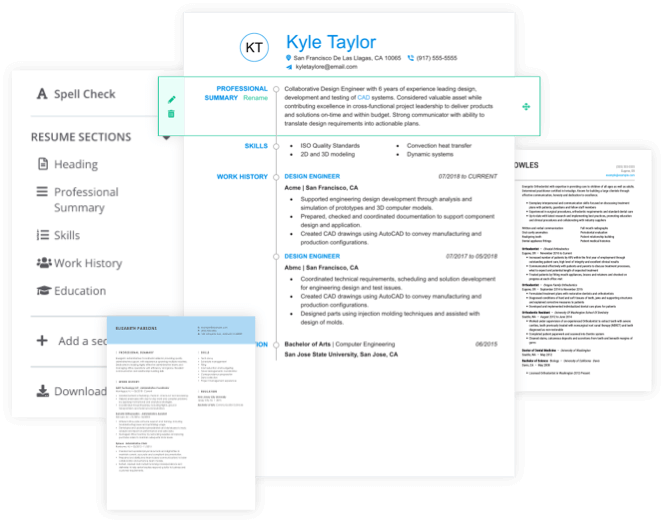- Featured in:

An electronic data interchange (EDI) analyst facilitates the exchange of electronic data within a company or between two entities by creating a computer system. This position in the field of information technology is ideal for those who love to solve problems and work with computers. EDI analysts can be found working in any industry that needs to share electronic data, such as healthcare or e-commerce. They typically work full time in an office environment but often interact with other departments, customers, or project team members.
Need cover letter guidance? Add a cover letter to your resume using our cover letter formats how-to guide and add value to your resume.
Improve your application with a personal message! Your resume may summarize your qualifications, but a cover letter can help you express your professional accomplishments and working style. Pair these cover letter templates with our builder subscription to unlock AI-powered text templates and professional designs that will help you submit a complete application.
EDI Analyst Duties and Responsibilities
While the system requirements of an EDI analyst will vary depending on their industry, there are a few universal tasks associated with this position. Based on an analysis of real-world job listings and resumes, these tasks are:
Translate Business Requirements into Technical Solutions
The core responsibility of an EDI analyst is to understand a business's needs and then create a computer program or system that fulfills those requirements. For example, if a business regularly makes an electronic transaction with customers or another business, the EDI analyst designs a system that allows different computers and operating platforms to work together and complete the transaction.
Build and Test Systems
Using appropriate software and coding languages, EDI analysts turn their design into a fully functional system. They then test the system for accuracy and get feedback on its functionality before activating it for widespread use.
Train Others in System Use
EDI analysts train new analysts and users in other departments to use the system they created, often explaining complex, technical topics in a way that anyone is able to understand.
Analyze and Suggest Improvements to Systems
Even after extensive testing, feedback, and activation, EDI analysts continue to analyze systems for accuracy and efficiency. They suggest alterations to the system design that will decrease errors or increase its functionality.
Provide Technical Support
Should any problems arise with the system, EDI analysts troubleshoot it and create solutions. They provide documentation at every stage of the system's life cycle so that its processes and details can easily be referenced by other analysts.
EDI Analyst Skills and Qualifications
EDI analysts have a solid understanding of information technology networking, system architecture, and coding. They are strong problem-solvers who are able to think several steps ahead when designing a system. Although employers will sometimes accept equivalent years of experience, they prefer candidates with a bachelor’s degree in information technology, computer science, or a related field. It’s also good to have two or three years of EDI experience along with the following skills:
- Software programming - EDI analysts are adept at using the various programming languages most commonly used to create systems that exchange electronic data
- System design expertise - using strong software design and architecture principles, EDI analysts create systems that work logically and efficiently
- Troubleshooting - EDI analysts leverage their understanding of system architecture and programming languages to identify the source of problems and make repairs
- Analytical thinking - analyzing the strengths and weaknesses of a particular course of action is necessary at almost every stage of a system's life cycle, whether it be the initial design process, testing, or troubleshooting
- Communication skills - EDI analysts are active listeners who can translate the needs of a business or client into a technical solution, then communicate that solution back to them in a way that is easily understood
Tools of the Trade
EDI analysts commonly use the following tools:
Office suite software (including Microsoft Word, Excel, Outlook)
EDI standards (such as X12 or EDIFACT)
Programming languages (such as XML, CSV, SQL, Java, and C+)
EDI Analyst Education and Training
While some employers are willing to hire EDI analysts with only a high school diploma and four to five years of EDI experience, more competitive candidates have a bachelor’s degree in information technology, computer science, or another computer-related subject. EDI analysts in more technically complex fields may decide to get a master’s degree in computer science or business administration.
EDI analysts may need to learn specialized knowledge depending on their industry. For example, someone working in a hospital will likely need to learn about health insurance, while someone working in a bank will need to understand finance and federal regulations. This knowledge can either be acquired on the job or through continuing education courses provided by colleges, universities, or industry organizations.
EDI Analyst Salary and Outlook
When categorized as computer systems analysts, the Bureau of Labor Statistics (BLS) states that EDI analysts earn a median annual wage of $88,000. The top 10 percent of analysts earn more than $139,000, while the lowest 10 percent earn less than $54,000.
However, median annual wages vary from industry to industry. Computer systems analysts working in finance, insurance, or computer systems design can expect to earn $90,000, while those working in government earn $77,000.
Through 2026, the BLS projects that employment of computer systems analysts will grow 9 percent. This is only slightly faster than the average for all occupations, which is 7 percent. EDI analysts working in healthcare may see additional growth.

Helpful Resources
If you’re ready to pursue a technically challenging but financially rewarding career as an EDI analyst, these in-depth resources will help get you on your way:
IEEE Computer Society
this ultimate resource for members of the Institute of Electrical and Electronics Engineers includes access to fieldspecific publications, professional education, conferences, and job boards
Association for Computing Machinery
like IEEE, this association offers its members access to educational resources, publications, research, and job listings for careers in computing
Mastering the Requirements Process: Getting Requirements Right
while every step of a system's life cycle is crucial, perhaps none has the potential to derail a project more than misunderstanding what the business or client wants to accomplish. This book delivers foolproof techniques for making sure you know what the problem is before setting out to create a solution
System Analysis and Design: An Object-Oriented Approach with UML
this textbook is a great reference for anyone who has a background in computer technology but is looking to increase their understanding of systems analysis
EDI Analyst Resume Help
Explore these related job titles from our database of hundreds of thousands of expert-approved resume samples:
- Edi Analyst
- Senior Programmer Analyst
- Software Quality Assurance Analyst




